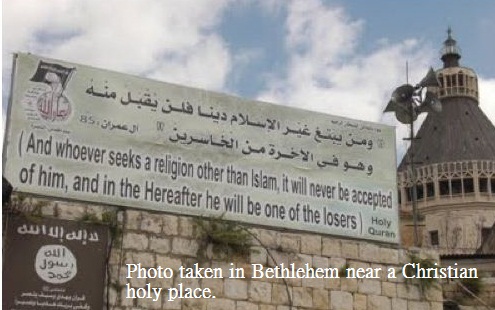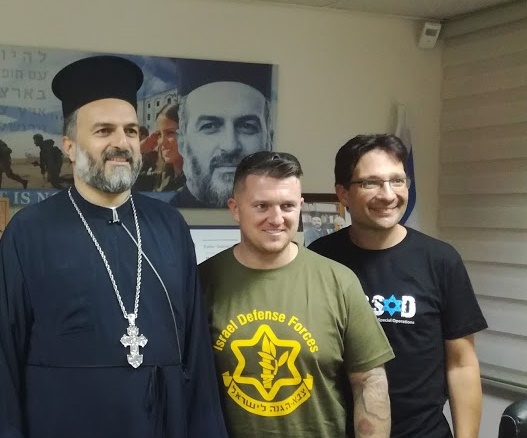Three years ago I was there in Bethlehem with Tommy Robinson for a meeting with Fr.Gabriel Naddaf. The priest had Israeli guards literally camped inside and outside his office due to his being both a Christian and having pro-Israel views.
The man is not a dhimmi…
“Silent Night”: Persecuted Palestinian Christians Kept Out of Sight
- In short, Palestinian Christians are suffering from the same patterns of persecution — including church attacks, kidnappings and forced conversion — that their coreligionists suffer in other Muslim nations. The difference, however, is that the persecution of Palestinian Christians has “received no coverage in the Palestinian media.”
- “The only thing that interests the PA [Palestinian Authority] is that events of this kind not be leaked to the media. Fatah regularly exerts heavy pressure on Christians not to report the acts of violence and vandalism from which they frequently suffer, as such publicity could damage the PA’s image….. Even less does the PA want to be depicted as a radical entity that persecutes religious minorities. That image could have negative repercussions for the massive international, and particularly European, aid the PA receives.” — Dr. Edy Cohen, “The Persecution of Christians in the Palestinian Authority”, Begin-Sadat Center, May 27, 2019.
- The bread and butter of the PA and its supporters, particularly in the media, is to portray the Palestinians as victims of unjust aggression and discrimination from Israel. This narrative would be jeopardized if the international community learned that Palestinians are themselves persecuting fellow Palestinians — solely on account of religion.
- “The systematic persecution of Christian Arabs living in Palestinian areas is being met with nearly total silence by the international community, human rights activists, the media and NGOs…” — Justus Reid Weiner, attorney, “Palestinian Christians: The plight of believers under Palestinian rule”, International Christian Embassy, Jerusalem.
 Christianity is on the verge of disappearing in the place of its birth, including Bethlehem (pictured). According to lawyer and scholar Justus Reid Weiner, “The systematic persecution of Christian Arabs living in Palestinian areas is being met with nearly total silence by the international community, human rights activists, the media and NGOs… In a society where Arab Christians have no voice and no protection it is no surprise that they are leaving.” (Image source: Daniel Case/Wikimedia Commons) Christianity is on the verge of disappearing in the place of its birth, including Bethlehem (pictured). According to lawyer and scholar Justus Reid Weiner, “The systematic persecution of Christian Arabs living in Palestinian areas is being met with nearly total silence by the international community, human rights activists, the media and NGOs… In a society where Arab Christians have no voice and no protection it is no surprise that they are leaving.” (Image source: Daniel Case/Wikimedia Commons) |
“The moment they [Hamas] took control [of the Gaza Strip], they started persecuting us, ruining our churches and forcing Christians to convert to Islam.”
Such are the recollections, reported recently, of Kamal Tarazi, a 60-year-old Christian man from Gaza, now living in the streets of Nazareth. Before fleeing, he tried to resist the Islamist takeover, including by calling on Muslims and Christians to unite against Hamas. As a result, “I was jailed several times. Do you know what a Hamas prison is? It is pure torture.”
The report adds that “the Islamic group decided to keep him alive to avoid depicting themselves as persecutors of the local Christian population, something that could potentially anger the international community.” Tarazi was eventually released, fled the region, returned, got imprisoned again, and fled again, permanently. “I am sure there are no more than 500 Christians left in Gaza,” he offers, “and it is just part of the general trend.”
His account is a reminder that, while reports on the persecution of Christians emerge regularly from other Muslim majority regions around the world, little is mentioned of those Christians living under the rule of Hamas in Gaza and the Palestinian Authority in the West Bank.
This is not because they experience significantly less persecution than their coreligionists. Open Doors, a human rights group that follows the persecution of Christians, notes in its most recent report that Palestinian Christians suffer from a “high” level of persecution, the source of which is, in its words, “Islamic Oppression”:
“Those who convert to Christianity from Islam, however, face the worst Christian persecution and it is difficult for them to safely participate in existing churches. In the West Bank they are threatened and put under great pressure, in Gaza their situation is so dangerous that they live their Christian faith in utmost secrecy… The influence of radical Islamic ideology is rising, and historical churches have to be diplomatic in their approach towards Muslims.”
It seems that the unique situation of Palestinian Christians — living in a hotly contested arena with much political and media wrangling in the balance — best explains the lack of news from that area.


